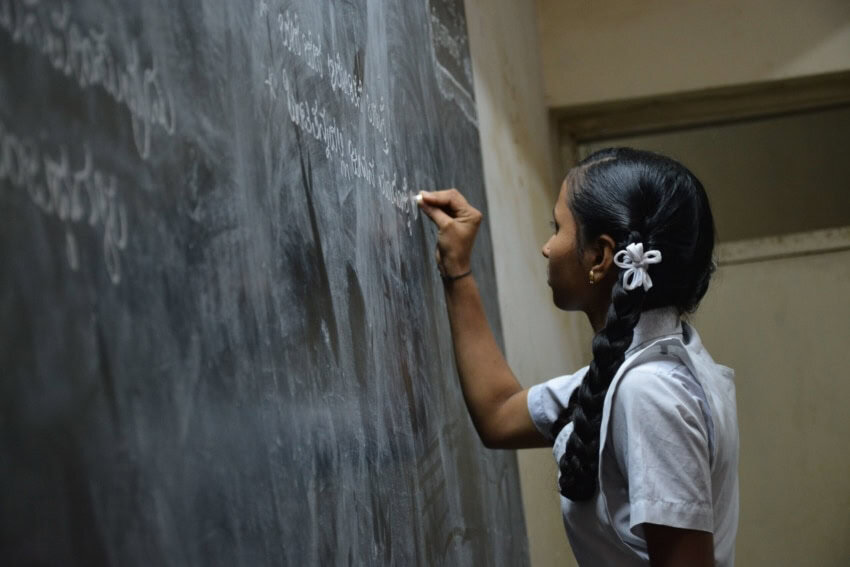World Education Day Honors Human Rights
Updated: June 19, 2024
Published: January 24, 2020

Education benefits people individually and, in turn, society as a whole. To honor the idea that education is a human right, the United Nations General Assembly has proclaimed January 24, 2020 as the International Day of Education. World Education Day aims the spotlight on the necessity of education and helps to establish advocacy efforts to ensure that education is a human right for all.
According to UNESCO, “258 million children and youth still do not attend school.” The statistics are unnerving around the world. As such, it’s time to make changes. University of the People stands in line with the goals of UNESCO and the United Nations in creating a world where education is considered a basic human right.
The power is in all of our hands to help people around the world receive an education. Here’s what you need to know about the important day.
What is an International Day?
There are many different international days that are proclaimed and recognized around the world. The goal of having international days is to raise awareness of an issue and gather the public to address global problems.
International days existed before the creation of the United Nations, but the UN has helped to make them powerful advocacy tools for change.
What is the International Day of Education?
The International Day of Education is a day of programming and events around the world with the goal to raise awareness about education. The events are meant to celebrate how education can help to achieve global peace and sustainable development. The day was proclaimed in 2018 by the UN General Assembly. It always takes place on January 24.
Back in 1948, representatives created the Universal Declaration of Human Rights which was proclaimed by the United Nations General Assembly in Paris. Since then, the document has been translated into 500 different languages. Article 26 of the Universal Declaration of Human Rights deems education to be a human right. That’s why on January 24, this notion will be brought into focus and celebrated in an effort to create change.

Photo by Nikhita S on Unsplash
Education as a Human Right
As mentioned above, every year since 2018 has witnessed January 24 to be the International Day of Education. This is also because UNESCO has a mandate for 2030. On that mandate, education is a main part of the agenda.
As such, the International Education Day is focused on “learning for people, planet, prosperity, and peace,” with an aim to help UNESCO resolve current educational challenges around the world.
This year’s approach focuses on the four “P’s”, namely:
1. People:
People have a basic right to education. Education not only benefits people, but also society as a whole. It can help eliminate vulnerable populations, end poverty, lessen gender inequality, and strengthen democracy.
2. Planet:
As time goes on, humans continue to put a strain on the Earth and natural resources. Without sufficient changes and improvements, we will continue to witness the loss of biodiversity and detrimental climate change. Education can help to protect our world. Education can offer new solutions, perspectives, and the development of tools that can protect and save our environment.
3. Prosperity:
Education is directly linked to one’s income. With more education, people have greater opportunities and possibilities. The rate of return is even higher for poor countries. This means that if someone in a poor country has access to education, the effect is very large because it is such a dramatic difference from the status quo, where unskilled workers make up the majority of the population. That’s why education should be a priority.
4. Peace:
Violence threatens education. In war-torn countries, some students are unable to attend school because of the danger. UNESCO reports that a recent study of 100 countries determined that the ones with wider education gaps are more likely to be suffering from conflict. By protecting peace, societies can support better educational opportunities.
International Education Day – Get Involved!
On January 24, there will be events around the world to celebrate World Education Day.
Here’s a quick look at some events taking place:
- Major UNESCO supported event in New York
- Half-day event in Paris: UNESCO Headquarters
- UNESCO Field Offices: Various events in locales
- UNESCO Global Education Monitoring Report: will launch an online tool to visualize progress within education
Challenges to Achieving Education as a Human Right
To most people, it feels like it’s obvious that education should be a human right. Unfortunately, the reality our world faces has proven otherwise.
UNESCO has predicted that by 2025, 100 million students won’t be able to attend universities because there literally will be a lack of seats.
In other countries, war and poverty inhibit the population from being able to go to school. There is a widening shortage of teachers in various countries around the world.
Plus, even in developed countries like the United States, the cost of private universities continues to rise.
Therefore, the world faces multiple and specific challenges when it comes to education.
On the bright side, there are many organizations like UNESCO and the University of the People that are working towards supporting education as a human right.

Photo by Jacqueline Kelly on Unsplash
University of the People – An Accessible Solution
In 2009, a man named Shai Reshef had a vision to create an institution to provide higher education to all those seeking a degree. That’s why he created the University of the People, an accredited American online university that is tuition-free.
In an effort to make education both affordable and accessible, the University of the People relies on volunteers and donors so that it can remain tuition-free.
With everything being digital, the only requirement to receive a top-notch education is to have internet access (on any device).
With students from over 200 countries and territories around the world, the University has provided thousands of degrees. Importantly, many of these degrees have been earned by students who would have otherwise missed the opportunity to receive higher education because of factors outside of their control.
For example, the University has helped refugees and students from war-torn countries achieve success with its online offerings.
Moreso, even in countries with developed educational systems, students have opted into learning at the University of the People because the flexibility and online nature of the program.
UoPeople’s revolutionary model for high-quality, tuition-free, online education is only growing in numbers with the help of our academic and corporate partners.
Currently, there are four degree-granting programs in the following subjects: Computer Science, Health Science, Education, and Business Administration. The programs vary by offering associate’s degrees, bachelor’s degrees, and master’s degrees.
Falling in line with the goals of the International Day of Education, the University of the People is proud to offer a growing solution for the educational crisis that our world faces.
Change Starts with You
Whether you are an individual with an education, seeking education, or someone who recognizes the importance of education as a human right, you can celebrate World Education Day.
Attend an event, share a statistic, do some research, volunteer at an educational nonprofit, or simply spread the word about the day.
As a current or prospective student, you should always feel as though education is accessible. That’s where the University of the People can help! Learn more about our programs or become a volunteer.
